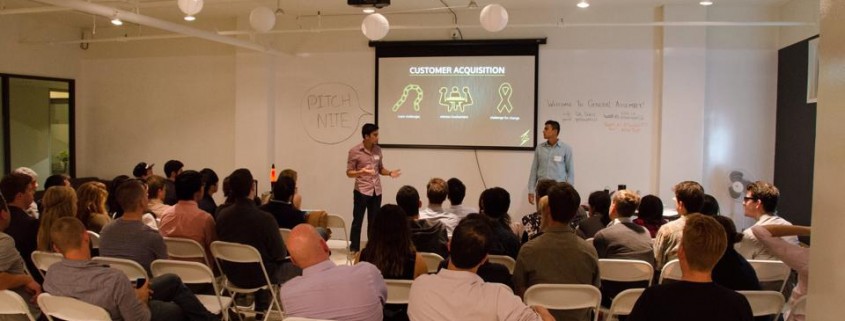LavaLab teams present pitches to entrepreneurs
Eight LavaLab teams presented their preliminary pitches to an audience of entrepreneurs on Tuesday night. These teams will be matched up as their mentors in preparation for the organization’s noted Demo Night in April to present their potentially marketable products.
The private event was held at the General Assembly in Downtown Los Angeles and included a networking mixer at 7 p.m. before the pitches began at 8 p.m. In addition to group pitches, LavaLab teams were matched up with entrepreneurs in the audience who expressed interest in mentoring them during the creation phase of the project process.
“I think it’s overall just going to be a really great time because it’s going to be hosted off-campus so we get to mix with the mentors we’re going to be working with in a more real-life setting,” said Anubhav Sarkar, director of public relations for LavaLab, prior to the presentation portion of the event. “It’s going to be a lot of fun in a casual environment.”
LavaLab is an interdisciplinary student-run incubator that combines business, law and technology and gives eight teams of four or five people the opportunity to develop a startup product over 11-week curriculum.
“When you join as a team, the first meetings are how you brainstorm, how you come up with a good idea,” Zhang said. “You ask, ‘Is there a market for your idea?’”
From there, LavaLab teams transition into the prototyping phase of their ideas alongside entrepreneurial training.
“We teach everything from graphic design to public speaking to market feasibility,” Zhang said. “In between we have private speaking events featuring different entrepreneurs, each there for a specific teaching purpose.”
The last eight weeks consist of actual development of the project, which can include coding an application, developing a new form of social media or designing a useful household product.
“We like the kinds of people who are proactive and go out and seek opportunities,” Zhang said. “I think curating that kind of mentality creates a culture of building cool things.”
Pitch night consisted of three minute presentations followed by five-minute general crowd Q&A forum per team.
“As the halfway point of the curriculum, this is the checkpoint for our teams and a great opportunity for feedback,” Zhang said. “It’s a time when teams can say to mentors, ‘Here’s what I’m working on. What do you think of it?’”
One team pitched their idea for an application, Cache, which allows users to customize a savings plan that automatically transfers a selected amount of money on, say, a weekly or monthly basis for a specific product they want to purchase but cannot afford at the time.
“Cache is especially useful for saving for that midsize product,” said Syed Ibrahim, a junior majoring in business administration.
“It would be especially useful for younger people who struggle with saving and instant gratification,” said his teammate Nathan Reardon, a junior majoring in chemical engineering. “You know when the deadline is, and we’ll help you know how much to allocate.”
Another pitch, Travel Circle, allows users to connect with their friends and share information about where they have been on customized profiles.
“You can sort by countries or categories, like countries, waterfalls, parks or beaches,” said Alex Ogorek, a junior majoring in computer science. “If you add a place to your bucket list, you can see it in our profile, and if you click on one of your friend’s pictures, you can see where they’ve been. We’re targeting younger people, typically college students who are studying abroad and want to get firsthand insight on where to go.”
Sarkar presented his group’s proposed app, Zap, in which users challenge each other to dares of various parameters and timeframes. A newsfeed would consist of recipients providing photo or video proof of their accepted challenges.
“Zap lets you to see the crazy, new, exciting things those around you are doing,” Sarkar said. “Challenges aren’t always incentivized, but with Zap, you can raise the stakes by tossing money in.”
More networking followed the pitches and timed question and answer sessions, allowing mentors to approach the teams with additional questions and constructive criticism.
“I think the thing for everyone is how they’re actually going to get themselves out there in the market,” said Shane Webster, director of business development for The Noun Project. “It’s easy to make a product and put it on the App Store, but marketability is just as important as the idea.”
Zhang emphasized pitch night as a crucial precursor to Demo Night, a formal event in which teams present their more refined products to judges. He has high hopes the organization will continue to improve and produce marketable products.
“It’s really about continuing to build this less of a student organization and more of a program that outside people recognize,” Zhang said. “Two or three people have gotten job offers and it’s incredible knowing that this organization has played a role in their career development and professional life.”

